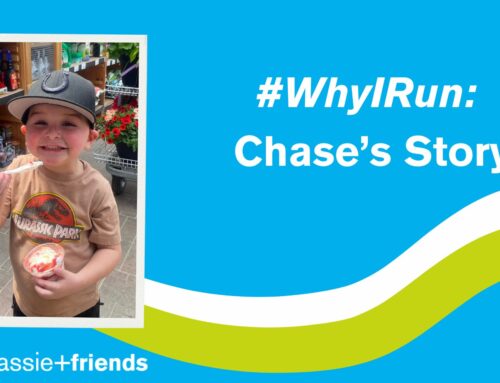Meet Oliver! A vibrant young boy with autoinflammatory disease living in Williams Lake, BC!
Oliver has always been the type of child that brings joy to everyone around him. We couldn’t go to the grocery store without the smiling baby drawing everyone near. His first year of life was good. He was a perfectly healthy, smiling, bundle of joy. Then, he started daycare. Like most children, he was always seeming to come down with something. He was always sick, but he always pulled through. Just normal old childhood viruses.
When he was almost three years old, he had his first case of clinically diagnosed “strep throat”. His lymph nodes around his neck became massive. His fever raged up to 41 degrees. He was prescribed antibiotics, yet days later his fever was so high he was shaking from chills. I was scared and unsure what to do. We went to the emergency room. The ER doctor said that sometimes antibiotics just take time. We continued with antibiotics until the fever dropped. He had eight days of high fever and weeks of lingering symptoms. Now, when I look back at his medical records, I see his throat culture came back negative for strep. This would be the first of many in the months to come.
Months later he had “strep throat” over and over again. He was constantly sick. We were consistently being called to come pick up our child from daycare. High fevers became regular. To the point it was almost like I could predict he would be sick again. Sometimes I brought him to the doctor and he would be prescribed antibiotics and sometimes we rode it out. It didn’t make a difference either way. I just wanted him to go even a full month without being sick. It was the middle of summer and no other kids were sick at home or at daycare. My husband and I both work full time outside the home and Oliver’s sickness was impeding on our ability to do this well.
We talked to our doctor and he said Oliver would definitely qualify for a trip to the ENT for a possible tonsillectomy. Great, sign us up! We went eagerly to our appointment while he was currently having a fever of 40 degrees. No way was I going to reschedule. We would never get there if we had to wait for him to be well.
She examined him and went over his symptoms and medical history. “I think he has PFAPA,” she said. She could see the confused and disbelieving look on my face. He just needs his tonsils pulled, I thought to myself. She handed me a printout on PFAPA and as I scrolled through the symptoms, I realized that he fit every single one of them. She prescribed him some liquid prednisone and suggested that we try it and see if it takes the fever away. Within four hours his fever was completely gone and it was as though he had never been sick.
Fast forward a few months and the fevers came back. My family doctor was hesitant to give him the prednisone in such large doses, so the fevers became more frequent. I was learning more about the disease and realized there were certain steps that needed to be taken to rule out other causes of periodic fever. His fevers were becoming sporadic and no longer predictable. We were referred to a pediatrician. She told us not to worry, just let him grow out of it. Keep giving him the prednisone when he is sick and that’s it. No testing required and no need for any other treatment.
That evening I went home and was scrolling through a Facebook group dedicated to autoinflammatory diseases that is moderated by members of the Autoinflammatory Alliance. It was mentioned that there was a study at BC Children’s Hospital for PFAPA. I emailed the pediatrician this information and she referred us.
His fever cycles continued to change over the next year and the fevers no longer were his most prominent symptom. In the winter months, he was worse. He had a lack of energy. He had tummy aches almost daily. Only eating a few bites of his favourite dinners and his tummy was “full”. He knew he was “full” because his tummy hurt. I remember one day, when he was complaining of a tummy ache, he became inconsolable. He was writhing in pain. To the point where we were packing up and getting ready to go to the hospital. I had never seen a child with that kind of tummy pain in my life. Before we got there, the pain started to subside.
He had a cold that was holding on and long after all other sickness had left, his lymph node on the side of his neck continued to grow. It got so large that I had no choice, but to bring him to his family doctor to have it checked. Maybe he actually had an infection this time? “What brings you here toda…umm never mind, let’s take a look” the doctor said as he looked at the giant lump on the side of his neck. He looked at his throat, he checked his ears, he looked in his nose and said, “hmm… why couldn’t it be something easy?” He hinted at lymphoma and wanted to rule it out. Oliver fit every symptom. He had blood tests completed. For two nights I didn’t get a wink of sleep waiting for the results. He had elevated inflammation markers, but no sign of cancer in his bloodwork.
Slightly before this incident we had seen the rheumatologist at BC Children’s Hospital and they prescribed colchicine, a medication most commonly used for gout. Our pharmacist had never seen a prescription for a child before so she had to look it up to ensure a mistake had not been made. Within a few weeks of him taking the colchicine his appetite increased dramatically. He was eating a lot, and I mean A LOT more. His energy levels improved and I realized just how sick he actually was before.
At our next appointment it was suggested that we do genetic testing. We would have blood drawn for a small panel. Once that panel was completed, then another larger panel could be done. We were told that quite often these tests would come back negative, but there are many periodic fever syndromes that still remain unknown. We did the small panel and it wasn’t negative, but there was a Variant of Uncertain Significance in a gene that causes the disease TRAPS. This still did not give him a diagnosis as he does not clinically fit this disease, but at this time no further testing would be completed as a larger panel was no longer being offered. How could it no longer be offered? Funding had been pulled. The outcome of genetic testing for Periodic Fever Syndromes was no longer deemed necessary.
Thanks to the research and information provided by the Autoinflammatory Alliance, we were able to partake in a “self-pay” option through Invitae for only $250 US. He had a full comprehensive immunodeficiency panel completed that tests for all known genes related to Periodic Fever Syndromes and more. Because it was such a large panel, there were several variants of uncertain significance, but one gene was of particular interest because it is a “gain of function” variant. My husband and I are in the process of being tested for this gene as recommended by Invitae.
Oliver is now six and continues to do well on colchicine. His disease was treated early with an effective treatment for him. Some people have unknown fever syndromes with every treatment option failing. Lots go well into adulthood without knowing why they are so sick. We hope that more awareness is spread and that research continues so more people with these diseases can be treated sooner, rather than later. The fevers are only one symptom of a systemic autoinflammatory disease. These diseases can be debilitating and, for some, life threatening if treatment is unable to intervene.
While it is difficult to access genetic testing for kids with periodic fever syndromes in most places in the country, our partners at BC Children’s Hospital (BCCH) and the Brown Lab at the BCCH Research Institute continue to advocate for children and families affected by these disorders and their need for enhanced screening.
BC Children’s Hospital Research Institute has announced it is providing Dr. Kelly Brown and Dr. Lori Tucker support advancement in research and improved care for children with systemic auto-inflammatory diseases in BC. Our aims are to become a recognized research centre for SAID, expand research to understand the immunologic changes and disease markers in children with unexplained SAIDs, and to enhance programs and support for kids with SAIDS and their families.










I have son that went through the same thing he was taking Persoidone for his PFAPA, his pediatrican never herd about it was the first , he started on it first birthday and we took to all the doctors to and at 2 yrs he had Pneumonia. Then we took him to John Hopkins where My Husband and I for out the he had Periodic fever, Dylan is now 12 yrs and fever free. So I know what you are going through. Thanks for your son story.
Stacy Solivan